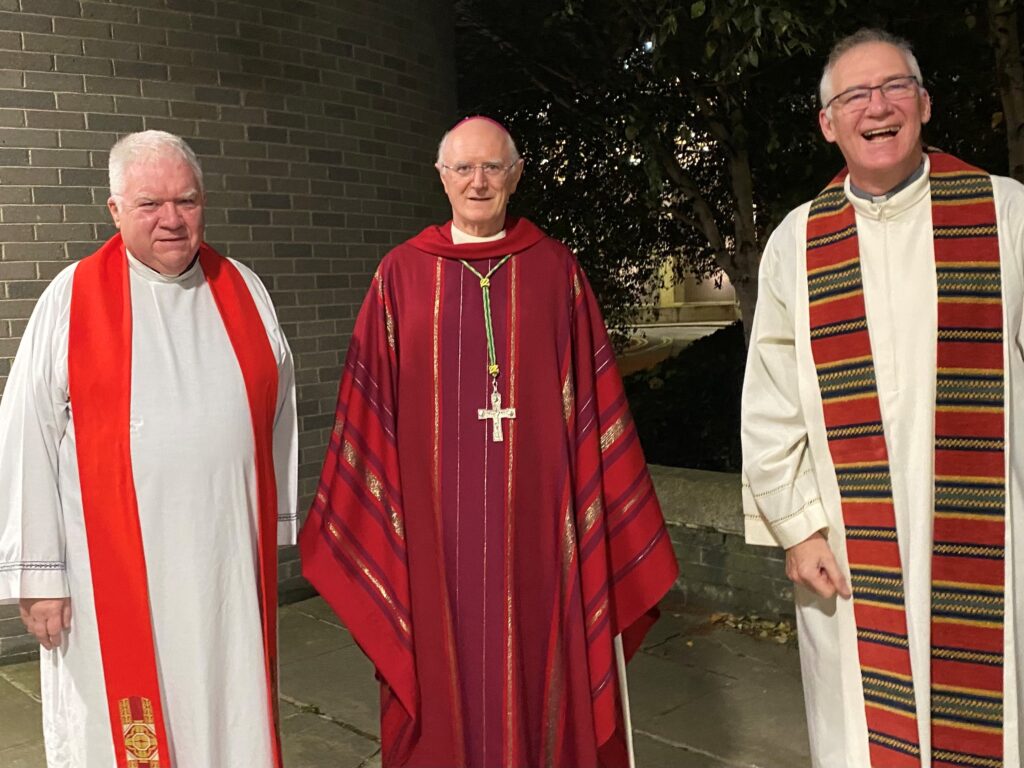Homily of Archbishop Dermot Farrell at the Mass for the Opening of the Academic Year
Wednesday, 10th November 2021
St Patrick’s Campus, DCU.
Welcome to all who have joined us for this Mass for the Opening of academic year as we ask God’s blessings on our work.
The importance of your role in the life of the Church in the Archdiocese of Dublin and its charge to pass on the teaching of Christ is visibly demonstrated by the fact that we have come together to ask God’s blessings on what we are undertaking, once again, this year.
We have come through a very difficult eighteen months with lockdowns, schools, colleges and universities closed. Online learning and teaching by has not been easy for students and teachers alike. It is in being present with each other to teach and learn that we truly express our nature.
The first reading (Isaiah 61:1–3, 8–9) offers us a prophetic portrait of the figure of the Messiah. As Jesus commenced his ministry in the synagogue of his native Nazareth, he made his own this vision from the prophet Isaiah: “The spirit of the Lord is upon me, for the Lord has anointed me, has sent me to bring good news to the poor. He has sent me to proclaim release to the captives, sight for the blind, to let the oppressed go free, to proclaim a year of the Lord’s favour” (Luke 4:18). Through Jesus, the Spirit-filled vision of Isaiah, inspired in turn the early Christian communities. In the end, it is a faith expressed in charity; a love rooted in faith and nourished by friendship with Christ. Saint Matthew captured it in Jesus’s startling declaration “If anyone is hungry or thirsty, naked or a stranger, sick or in prison, it is always Christ who looks for bread and water, Christ who cries to be clothed or welcomed, Christ whom you visit on a bed of pain or behind bars (Matt 25: 31-46). Here is a vision of a community where, as Paul puts it, no one, absolutely no one, can say to any other, “I have no need of you” (1 Cor 12:21). The mandate of Christ has become our mandate. As the mission of Jesus is a ministry of the Holy Spirit, we will not be able to carry out this mission without the Spirit, without the Lord and Giver of life as we pray in the Creed, without the One who is all-powerful, the promise of God poured into our hearts, as Paul put it to the Romans (Rom 5:5; see John 14: 25–26). May we always remember that the oneness with God, union with Christ in mission and in our very existence comes not from our own work, but is the gift of the Spirit who brought us into life at the very first moment of our existence, keeps us alive today, and will do so forever.
Catholic education—an authentic and vital ministry within the Church—is a space in which the mind and heart are continually reawakened to the workings of this same Holy Spirit, who encourages reflection and inspires action in the Church and in the world for the good of all: “Ask the Holy Spirit each day to help you experience anew the great message” — the message of hope, says Pope Francis: “Why not? You have nothing to lose, and he can change your life, fill it with light and lead it along a better path. He takes nothing away from you, but instead helps you to find all that you need, and in the best possible way” (Christus vivit, § 131).
To learn is to receive something. Learning—both informal and formal—is sharing. And what we receive we give: therefore, learning is also to be shared. It is not something to be kept to ourselves, but like love and compassion is to be given away, it is most truly itself when it is shared. It calls us to remember that our education makes us more human. Catholic education in particular, contributes to the growth and wellbeing of individuals, their community and society, caring for the common good, and now more explicitly too, caring for our common home. Through our schools we educate and empower young people; by means of education we enhance human dignity and potential. While this is undoubtedly our own work, it is also—at the same time—an unfolding through the power of the Spirit who offers us the gifts of knowledge, wisdom and right judgement. Pupils in Catholic schools not only benefit from academic formation and its social responsibility, but they also allow the Spirit to lead them into the fullness of the truth.
What Catholic education brings to the young people entrusted to our care is the horizon of faith. It opens up possibilities to explore the mysteries of life as the pathways to God. When we ask, how shall I live? What is the purpose of life? How should I decide my actions? We find our response in the light of Christ. His word and his life—the Good News that he is— give us a perspective inspired by the wisdom of God.
The Church offers to us today what it has offered to the world for two thousand years: it puts before us and offers us the encounter with Jesus. It offers us an invitation to the life of faith and its horizons.
In these islands the Church does this in partnership with the State which has an obligation to provide education for the children of all its people. A true plurality of patronage needs to ensure parental choice while enabling all patrons, including Catholic patrons, to be true to their own ethos and characteristic spirit. The Catholic ethos and characteristic spirit is rooted in the Christian vision of the human person, in what we have come to hold as essential for human life to flourish. Human life not some abstract idea, human life is our human life, in the end, our life as a people together—together with our children, together in family, but also together with others, together in our common home–so much under threat, and together with God, with the One whose Spirit dwells in our hearts, and longs to bring us home. Ultimately, the spiritual dimension is crucial when it comes to joy and hope which are gifts ‘from elsewhere’.
Catholic schools are valued across the world. Why? Because of, and not despite, their Catholic ethos, Catholic schools embrace a variety of young people of various cultural identities and nationalities, and the plurality of their religious and other belief systems. In responding to the action of the Spirit, who brings these young people to our doors, Catholic schools—primary or post-primary—have shown respect, generosity and hospitality while still upholding their Mission Statements and Ethos Policies.
One of the great strengths of faith-based schools has been their rootedness in local communities. Those who do not share our faith come to our schools because they know that at their heart there is the acceptance of values motivated by our faith – values that present a specific vision or view of human life. Furthermore, inter-religious and inter-belief dialogue is at the heart of the Catholic school enterprise as one of the means to imitate and live the vision and mission of Jesus (Congregation for Catholic Education, Educating to Intercultural Dialogue in Catholic Schools: Living in Harmony for a Civilisation of Love, 2013).
A Catholic school provides academically excellent education; it provides faith-based formation that allows each student to develop a moral foundation on which to stand for the rest of their lives and, it gives a vision and hope beyond the limits of value-free education. The Catholic school understands itself as supporting the efforts of parents and family and parish, such that it “contributes generously to the children’s faith development (Share the Good News, par 91).
It is, therefore, no surprise that we expect our schools to be different. Part of the reason they exist and why we gather this evening is because here we find a community gathered by the Lord Jesus that is founded on his values, that recognizes the importance of virtue, and that—conscious of human weakness—attempts to model respect, generosity, justice, hospitality, caring; in a word, what a faithful and faith-filled society is like.
Looking to the future of Catholic education, let us do so with hope, confidence and enthusiasm knowing that—in the life of faith and discipleship we have been given something to bring to those we teach that offers something new, something different—a further and wider horizon: the vision that God has for all his creatures. It is nothing short of the fullness of life.
‘The Spirit of God has filled the universe with possibilities and therefore, from the very heart of things, something new can always emerge.’ Pope Francis, Laudato Si’ 76. May God bless you and all who support Catholic education in the effort to make the Church’s vision of life come true.
END

Archbishop Dermot Farrell, Moderator of the Curia Fr Gareth Byrne, Episcopal Vicar for Education Monsignor Dan O’Connor








